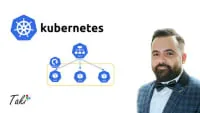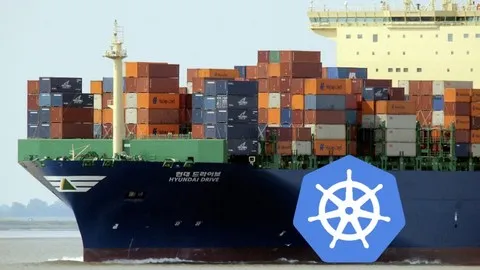
Kubernetes in 1 hour - Full Course 2022 
This comprehensive course provides an introduction to Kubernetes, including concepts and hands-on experience. In just one hour, you'll be ready to start using Kubernetes in 2022. ▼
ADVERTISEMENT
Course Feature
![]() Cost:
Cost:
Paid
![]() Provider:
Provider:
Udemy
![]() Certificate:
Certificate:
No Information
![]() Language:
Language:
English
Course Overview
❗The content presented here is sourced directly from Udemy platform. For comprehensive course details, including enrollment information, simply click on the 'Go to class' link on our website.
Updated in [April 29th, 2023]
This course provides an overview of Kubernetes and how it works. It covers the architecture of Kubernetes, as well as key concepts such as services, namespaces, scheduling, networking, storage, APIs, RBAC, and Kubectl. Participants will also have the opportunity to apply a deployment on a local K8S cluster in a lab setting. By the end of the course, participants will have a better understanding of Kubernetes and how to use it.
[Applications]
After completing this course, participants will be able to apply their knowledge of Kubernetes to create and manage their own Kubernetes clusters. They will be able to use the Kubernetes APIs to deploy applications, manage resources, and configure networking and storage. They will also be able to use the kubectl command line tool to manage their clusters. Finally, they will be able to use the Role-Based Access Control (RBAC) feature to secure their clusters.
[Career Paths]
1. Kubernetes Engineer: Kubernetes Engineers are responsible for designing, deploying, and managing Kubernetes clusters. They must have a deep understanding of the Kubernetes architecture and be able to troubleshoot any issues that arise. As Kubernetes becomes more popular, the demand for Kubernetes Engineers is increasing, and the role is becoming more specialized.
2. Cloud Architect: Cloud Architects are responsible for designing and implementing cloud-based solutions. They must have a deep understanding of cloud technologies, such as Kubernetes, and be able to design and deploy solutions that are secure, scalable, and cost-effective. As cloud computing continues to grow, the demand for Cloud Architects is increasing.
3. DevOps Engineer: DevOps Engineers are responsible for automating the deployment and management of applications. They must have a deep understanding of DevOps tools, such as Kubernetes, and be able to design and implement solutions that are secure, scalable, and cost-effective. As DevOps continues to grow, the demand for DevOps Engineers is increasing.
4. Data Scientist: Data Scientists are responsible for analyzing and interpreting data. They must have a deep understanding of data science tools, such as Kubernetes, and be able to design and implement solutions that are secure, scalable, and cost-effective. As data science continues to grow, the demand for Data Scientists is increasing.
[Education Paths]
1. Bachelor of Science in Computer Science: This degree path provides students with a comprehensive understanding of computer science fundamentals, such as programming, software engineering, and computer architecture. It also covers topics related to Kubernetes, such as distributed systems, cloud computing, and containerization. This degree path is becoming increasingly popular as the demand for Kubernetes professionals grows.
2. Master of Science in Cloud Computing: This degree path focuses on the development and deployment of cloud-based applications and services. It covers topics such as cloud architecture, distributed systems, and containerization. It also provides students with an in-depth understanding of Kubernetes, including its architecture, concepts, and APIs.
3. Master of Science in Data Science: This degree path focuses on the analysis and interpretation of large datasets. It covers topics such as machine learning, data mining, and data visualization. It also provides students with an understanding of Kubernetes, including its architecture, concepts, and APIs. This degree path is becoming increasingly popular as the demand for data scientists with Kubernetes expertise grows.
4. Master of Science in Artificial Intelligence: This degree path focuses on the development of intelligent systems. It covers topics such as machine learning, natural language processing, and computer vision. It also provides students with an understanding of Kubernetes, including its architecture, concepts, and APIs. This degree path is becoming increasingly popular as the demand for AI professionals with Kubernetes expertise grows.
Course Syllabus
What is K8S
Architecture of K8S
Kubernetes Objects
Manifests (yaml)
Services
Namespaces
Scheduling
Networking
Storage
APIs
Authentication & Authorization
Kubectl
Pros & Cons

Knowledgeable, Enlightening, Good Explanation, Comprehensive, Very Useful.

None.
Course Provider

Provider Udemy's Stats at AZClass
Discussion and Reviews
0.0 (Based on 0 reviews)
Explore Similar Online Courses

The Python Mega Course: Build 10 Real World Applications

JavaScript for beginners

Python for Informatics: Exploring Information

Social Network Analysis

Introduction to Systematic Review and Meta-Analysis

The Analytics Edge

DCO042 - Python For Informatics

Causal Diagrams: Draw Your Assumptions Before Your Conclusions

Whole genome sequencing of bacterial genomes - tools and applications

Kubernetes for Beginners (Kubernetes + Docker)

Scalable Microservices with Kubernetes


Start your review of Kubernetes in 1 hour - Full Course 2022